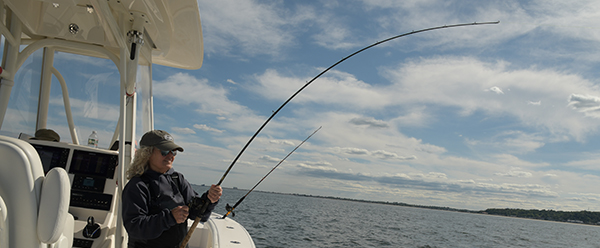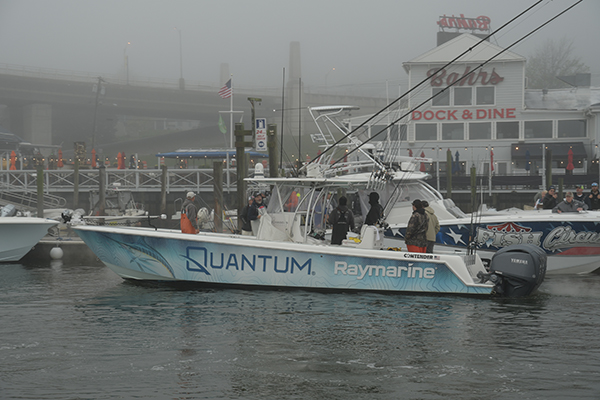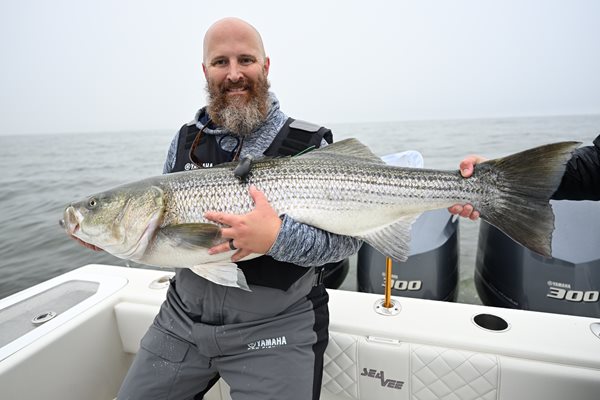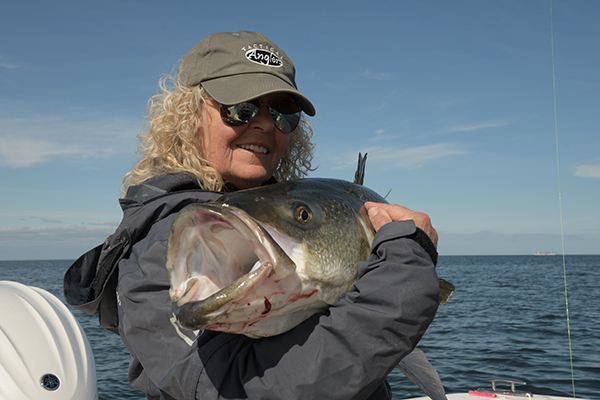Under the guidance of Bill Dobbelaer and Roxanne Willmer, Gray FishTag Research has become the world’s largest international cooperative fish tagging and research program. It is powered by the top sportfishing captains, mates, and advisory board members along with a growing list of corporate sponsors from the recreational marine and fishing tackle industries. Their teams and volunteers conduct tagging research efforts on all species of recreationally caught fish and are in the forefront of satellite tagging studies worldwide.
Initially, the FishTag mission was to work closely with sportfishing professionals to tag the fish they catch for research purposes while introducing their clients, the thousands of anglers who fish on their boats each year, to the world of fish tagging. In essence, it makes them part of the process of generating research data on the fish they love to catch in an inclusive and meaningful way. For many, tagging a fish they catch is their introduction to the importance of fisheries conservation. However, the program has grown beyond charter captains and light tackle guides and is open to anglers who want to tag by allowing them to purchase tagging kits and tools and report their releases. Gray uses a streamlined method of data collection. Each tag comes attached to a data card that is filled out after the release. The information is provided to Gray by either mailing the cards to their headquarters or by going online and transferring the information from the card directly into the database. Taggers are encouraged to name each fish, which makes the experience even more personal. The process of tagging the fish with the Gray’s green spaghetti tags for inshore species or with dart tags for larger pelagic fish like billfish, tunas and sharks is straightforward. Roxanne and her staff can guide newcomers through the process and information sheets that come with the tagging kits reenforce proper application technique.

Yamaha is an active supporter of programs and organizations involved in conservation, habitat improvement and sustainability efforts through its critically acclaimed Yamaha Rightwaters project. This year Gray FishTag Research became the most recent addition to the program’s recipients through a grant.
“The decision to support Gray FishTag and their StriperQuest tagging tournament was really about how it meets the four pillars that steer Yamaha Rightwaters” says Joshua Grier. “Supporting academic marine research is a key tenant of our mission, and Gray FishTag is doing just that. Understanding the health of important fisheries and the movements of fish species is instrumental in successful fisheries management. The fact that StriperQuest made gathering data an exciting community engagement event is that much more compelling. Opportunities to get boating and fishing communities involved in research are always wins, not only for Yamaha Rightwaters but for the recreational community at large.”

Of all the species Gray’s volunteers have tagged and released none come close to the number of striped bass, a fact that speaks volumes about the popularity of that gamefish and the buy in from the sportfishing community that values them. While most species have tag totals numbering in the dozens or in some cases the hundreds, thousands of striped bass are currently swimming around with Gray’s tags since 2015, and thirty-seven have carried MiniPAT archival satellite tags greatly expanding our knowledge of their travels. The StriperQuest Tag Tournament was a team decision with support from Mike Caruso and Jim Hutchinson of The Fisherman® magazine, which helps promote and organize the event alongside Roxanne and Gray personnel. The first tagging get-together was by invitation and consisted of a small group of charter captains and sportfishing writers, but it was so popular many more captains wanted to participate. This year’s tournament was held at Gateway Marina, a long-standing Yamaha dealership situated on the Shrewsbury River in Highlands, New Jersey and attended by Yamaha’s social media representatives, Matt Ezell and Clint Bartlett. The location is close to the epicenter of a major striped bass spawning and nursery area which provides plenty of opportunity to catch and tag bass of all sizes.

Industry support for FishTag has been growing steadily each year as more companies become sponsors, and sponsor representatives attend the various tagging events held each year to fish alongside the contestants. This past year StriperQuest had a three-hundred-dollar entry fee and awarded cash prizes. Fifteen percent of the entry fee goes to Gray with the first, second and third place winners each receiving a percentage of the cash along with other donated prizes. Plans are already in the works for the next StriperQuest. Dates and location will be announced on Gray’s website and in The Fisherman® magazine if you would like to participate.
If you are wondering just how prevalent striper tagging has become as a result of Gray’s programs, in 2023 alone, 2210 striped bass were tagged and eighty-eight bass tagged in prior years were recaptured, some hundreds of miles from the initial tag location. In 2024, 2293 stripers were tagged and there were 91 recaptures. The dataset Grays is compiling on the species represents a large sampling and the recapture rates are extraordinary. All those fish carrying green spaghetti tags provide migratory and growth data when recaptured, but the fish carrying MiniPAT satellite tags gather far more data over a longer period of time, including geolocation tracking, water temperature, depth and more recorded at specific time intervals. Each sat tag is scheduled to release from the host fish after three to six months depending on the programming. After release, it floats to the surface and downloads the bulk of the collected data to a satellite which transmits it back to Gray. In a number of cases, the actual sat tag has been recovered which allows an even greater treasure trove of data from its memory chip. A few of the earliest stripers carrying sat tags traveled to the edge of the Continental Shelf and into submarine canyons, something scientists never dreamed of before. They were out there swimming with tunas and marlin for a month or two, although others take more inshore track. MiniPAT satellite tags are expensive costing $5000 each with donations by individual anglers, tournaments, sponsors and grants helping to defray the cost.
.jpg)
While the striped bass has taken center stage in the program over seventy-five species of fish have been tagged internationally. The Fishtag Roosterfish Rodeo held at Marina Pez Vela in Costa Rica is a prime example. Roosters are a popular gamefish on the Pacific coast of Central America, but little is known about the species’ movements. In 2024, twenty-seven teams tagged and released twenty-seven roosters, up from 15 tagged the prior year. And each year several roosters had sat tags affixed which have been telling their migratory story in greater detail. Another tagging safari in Costa Rica is carried out in conjunction with the Pescador Billfish Championship and is aimed at tagging blue and black marlin. Billfish are recreationally important species responsible for large sums of tourism dollars for the region so the desire to know more about their population and migratory travels is economically and scientifically important. Similar tagging projects involving swordfish, amberjack and redfish research projects are ongoing in Florida, and there are even four great white sharks that have carried Gray sat tags to track their migration from Florida northward each season.
The number of fish tagged by program volunteers since the organization’s inception keeps growing. There were 2,827 fish tagged in 2021, 3,670 in 2022, 4300 in 2023 and 4600 in 2024. Through the dedication of Roxanne Willmer, Bill Doeblear and the many captains and anglers who participate, Gray FishTag Research is building extensive datasets on numerous species of fish. Roxanne explained that the data they generate is opensource which means it can be accessed and reviewed by scientists, fisheries management bodies and even individuals like you and me at no cost. If you would like to learn more or become part of this exciting program hope over to Grayfishtagresearch.org and don’t hesitate to call them with any questions. Yamaha is proud to help support the important work that they do.
Back to Blue Life
Initially, the FishTag mission was to work closely with sportfishing professionals to tag the fish they catch for research purposes while introducing their clients, the thousands of anglers who fish on their boats each year, to the world of fish tagging. In essence, it makes them part of the process of generating research data on the fish they love to catch in an inclusive and meaningful way. For many, tagging a fish they catch is their introduction to the importance of fisheries conservation. However, the program has grown beyond charter captains and light tackle guides and is open to anglers who want to tag by allowing them to purchase tagging kits and tools and report their releases. Gray uses a streamlined method of data collection. Each tag comes attached to a data card that is filled out after the release. The information is provided to Gray by either mailing the cards to their headquarters or by going online and transferring the information from the card directly into the database. Taggers are encouraged to name each fish, which makes the experience even more personal. The process of tagging the fish with the Gray’s green spaghetti tags for inshore species or with dart tags for larger pelagic fish like billfish, tunas and sharks is straightforward. Roxanne and her staff can guide newcomers through the process and information sheets that come with the tagging kits reenforce proper application technique.

Yamaha is an active supporter of programs and organizations involved in conservation, habitat improvement and sustainability efforts through its critically acclaimed Yamaha Rightwaters project. This year Gray FishTag Research became the most recent addition to the program’s recipients through a grant.
“The decision to support Gray FishTag and their StriperQuest tagging tournament was really about how it meets the four pillars that steer Yamaha Rightwaters” says Joshua Grier. “Supporting academic marine research is a key tenant of our mission, and Gray FishTag is doing just that. Understanding the health of important fisheries and the movements of fish species is instrumental in successful fisheries management. The fact that StriperQuest made gathering data an exciting community engagement event is that much more compelling. Opportunities to get boating and fishing communities involved in research are always wins, not only for Yamaha Rightwaters but for the recreational community at large.”

Of all the species Gray’s volunteers have tagged and released none come close to the number of striped bass, a fact that speaks volumes about the popularity of that gamefish and the buy in from the sportfishing community that values them. While most species have tag totals numbering in the dozens or in some cases the hundreds, thousands of striped bass are currently swimming around with Gray’s tags since 2015, and thirty-seven have carried MiniPAT archival satellite tags greatly expanding our knowledge of their travels. The StriperQuest Tag Tournament was a team decision with support from Mike Caruso and Jim Hutchinson of The Fisherman® magazine, which helps promote and organize the event alongside Roxanne and Gray personnel. The first tagging get-together was by invitation and consisted of a small group of charter captains and sportfishing writers, but it was so popular many more captains wanted to participate. This year’s tournament was held at Gateway Marina, a long-standing Yamaha dealership situated on the Shrewsbury River in Highlands, New Jersey and attended by Yamaha’s social media representatives, Matt Ezell and Clint Bartlett. The location is close to the epicenter of a major striped bass spawning and nursery area which provides plenty of opportunity to catch and tag bass of all sizes.
Industry support for FishTag has been growing steadily each year as more companies become sponsors, and sponsor representatives attend the various tagging events held each year to fish alongside the contestants. This past year StriperQuest had a three-hundred-dollar entry fee and awarded cash prizes. Fifteen percent of the entry fee goes to Gray with the first, second and third place winners each receiving a percentage of the cash along with other donated prizes. Plans are already in the works for the next StriperQuest. Dates and location will be announced on Gray’s website and in The Fisherman® magazine if you would like to participate.
If you are wondering just how prevalent striper tagging has become as a result of Gray’s programs, in 2023 alone, 2210 striped bass were tagged and eighty-eight bass tagged in prior years were recaptured, some hundreds of miles from the initial tag location. In 2024, 2293 stripers were tagged and there were 91 recaptures. The dataset Grays is compiling on the species represents a large sampling and the recapture rates are extraordinary. All those fish carrying green spaghetti tags provide migratory and growth data when recaptured, but the fish carrying MiniPAT satellite tags gather far more data over a longer period of time, including geolocation tracking, water temperature, depth and more recorded at specific time intervals. Each sat tag is scheduled to release from the host fish after three to six months depending on the programming. After release, it floats to the surface and downloads the bulk of the collected data to a satellite which transmits it back to Gray. In a number of cases, the actual sat tag has been recovered which allows an even greater treasure trove of data from its memory chip. A few of the earliest stripers carrying sat tags traveled to the edge of the Continental Shelf and into submarine canyons, something scientists never dreamed of before. They were out there swimming with tunas and marlin for a month or two, although others take more inshore track. MiniPAT satellite tags are expensive costing $5000 each with donations by individual anglers, tournaments, sponsors and grants helping to defray the cost.
.jpg)
While the striped bass has taken center stage in the program over seventy-five species of fish have been tagged internationally. The Fishtag Roosterfish Rodeo held at Marina Pez Vela in Costa Rica is a prime example. Roosters are a popular gamefish on the Pacific coast of Central America, but little is known about the species’ movements. In 2024, twenty-seven teams tagged and released twenty-seven roosters, up from 15 tagged the prior year. And each year several roosters had sat tags affixed which have been telling their migratory story in greater detail. Another tagging safari in Costa Rica is carried out in conjunction with the Pescador Billfish Championship and is aimed at tagging blue and black marlin. Billfish are recreationally important species responsible for large sums of tourism dollars for the region so the desire to know more about their population and migratory travels is economically and scientifically important. Similar tagging projects involving swordfish, amberjack and redfish research projects are ongoing in Florida, and there are even four great white sharks that have carried Gray sat tags to track their migration from Florida northward each season.
The number of fish tagged by program volunteers since the organization’s inception keeps growing. There were 2,827 fish tagged in 2021, 3,670 in 2022, 4300 in 2023 and 4600 in 2024. Through the dedication of Roxanne Willmer, Bill Doeblear and the many captains and anglers who participate, Gray FishTag Research is building extensive datasets on numerous species of fish. Roxanne explained that the data they generate is opensource which means it can be accessed and reviewed by scientists, fisheries management bodies and even individuals like you and me at no cost. If you would like to learn more or become part of this exciting program hope over to Grayfishtagresearch.org and don’t hesitate to call them with any questions. Yamaha is proud to help support the important work that they do.
Back to Blue Life
